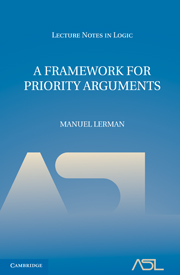Book contents
- Frontmatter
- Contents
- PREFACE
- CHAPTER 1 INTRODUCTION
- CHAPTER 2 SYSTEMS OF TREES OF STRATEGIES
- CHAPTER 3 Σ1 CONSTRUCTIONS
- CHAPTER 4 Δ2 CONSTRUCTIONS
- CHAPTER 5 Π2 CONSTRUCTIONS
- CHAPTER 6 Δ3 CONSTRUCTIONS
- CHAPTER 7 Σ3 CONSTRUCTIONS
- CHAPTER 8 PATHS AND LINKS
- CHAPTER 9 BACKTRACKING
- CHAPTER 10 HIGHER-LEVEL CONSTRUCTIONS
- CHAPTER 11 INFINITE SYSTEMS OF TREES
- REFERENCES
CHAPTER 6 - Δ3 CONSTRUCTIONS
Published online by Cambridge University Press: 04 August 2010
- Frontmatter
- Contents
- PREFACE
- CHAPTER 1 INTRODUCTION
- CHAPTER 2 SYSTEMS OF TREES OF STRATEGIES
- CHAPTER 3 Σ1 CONSTRUCTIONS
- CHAPTER 4 Δ2 CONSTRUCTIONS
- CHAPTER 5 Π2 CONSTRUCTIONS
- CHAPTER 6 Δ3 CONSTRUCTIONS
- CHAPTER 7 Σ3 CONSTRUCTIONS
- CHAPTER 8 PATHS AND LINKS
- CHAPTER 9 BACKTRACKING
- CHAPTER 10 HIGHER-LEVEL CONSTRUCTIONS
- CHAPTER 11 INFINITE SYSTEMS OF TREES
- REFERENCES
Summary
Δ3 constructions are similar to Δ2 constructions, raised by a level. They take place on four trees, T0, T1, T2 and T3, and are characterized by the following property: If η3 ⊂ ν3 ∈ T3, ν3 corresponds to a terminal node of the basic module associated with η3, lev(η3) = 3, and η3 has Π outcome along ν3, then no requirement is assigned to ν3 or any of its successors. In this case, the falsity of the directing sentence assigned to η3 together with activated action for this node suffices to prove the theorem.
We prove one theorem falling under this classification, the Sacks Density Theorem, in Section 6.2. We discuss certain types of requirements encountered in Δ3 constructions and state lemmas delineating properties of these requirements in Section 6.1.
Δ3 Constructions
When functional axioms need to be declared and Player I controls the enumeration of one of the oracle sets, the construction becomes more complex. This is the case when we are trying to construct a degree within a given interval. The simplest such case dealing with an arbitrary interval whose endpoints are computably enumerable degrees is the density theorem, proved in the next section; this theorem asserts that there is a computably enumerable set whose degree lies strictly between the endpoints of the interval. Thus we will be given computably enumerable sets U <TV controlled by Player I, and Player II will be assigned the responsibility to construct a computably enumerable set A such that U <TA <TV. Player II can replace A by U ⊕ A, and will use backtracking combined with permitting to show that A ≥TV.
- Type
- Chapter
- Information
- A Framework for Priority Arguments , pp. 93 - 102Publisher: Cambridge University PressPrint publication year: 2010
- 1
- Cited by



